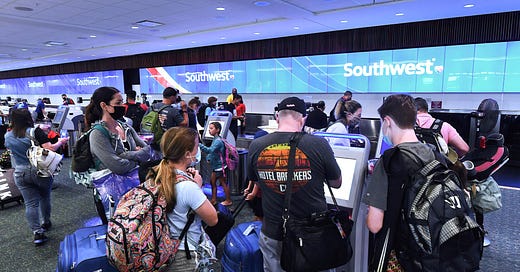
Thanks for finding Full Throttle. Please share and subscribe.
We are in the middle of it now. Happy Fourth of July weekend and welcome to some of the busiest air travel days of the year. If you fly, don’t be surprised if your flight is delayed, canceled, or rebooked. Supply is not meeting demand and the blame game is getting heated!
So what is the truth and why are fingers being pointed? Because flyers are not happy with the way they are being treated. Consumer complaints to the government about the airlines are three times higher than before the pandemic. That statistic, more than 3,100 complaints about US airlines, is from April, long before the summer travel season.

Jetliners taxi at Ronald Reagan Washington National Airport.
THROW A SWITCH?
The airlines received billions of taxpayer dollars to survive the pandemic when nearly all of us were grounded and sheltered in our homes. As vaccines came online, the carriers were ready to get back to business and you were ready to get out of the house. The problem is, and the airlines admit it, they can’t throw a switch and return to pre-pandemic levels of service. Critics suggest the airlines created schedules they could never fulfill.
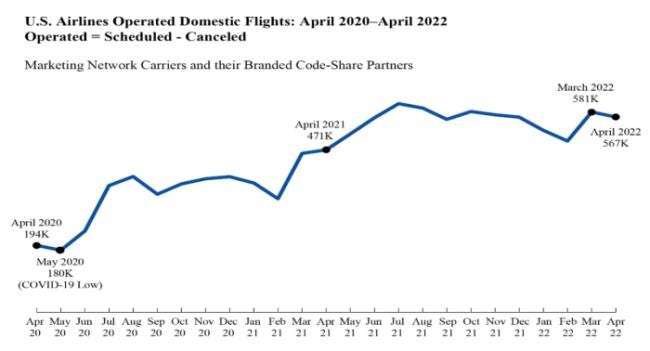
(Credit: US Bureau of Transportation Statistics)
Airports look packed, but the number of flyers is still about 10% below 2019 levels. Still, the airlines are struggling. "This phase of our recovery has been the most difficult. We've never had to bring the airline back at this speed before," as Delta Airlines Chief of Operations John Laughter was quoted on the company website.
PILOT SHORTAGE
The airlines conceded in the spring there would be problems. Like many businesses, airlines are dealing with a labor shortage. The most painful part is that there are not enough pilots to fly a full schedule. During the pandemic airlines offered early retirement and many pilots took the deal. The shortage forced airlines to cut their summer schedules 10-15% and those reductions are just now being implemented.
The airlines are making efforts to hire more pilots and increase pay to keep the pilots they have. Those efforts and programs will take time while the complaints keep piling up. Memorial Day weekend saw a meltdown for a couple of airlines when the weather didn’t cooperate. So maybe we shouldn’t be surprised that the airlines now are claiming, “it’s not all our fault.”
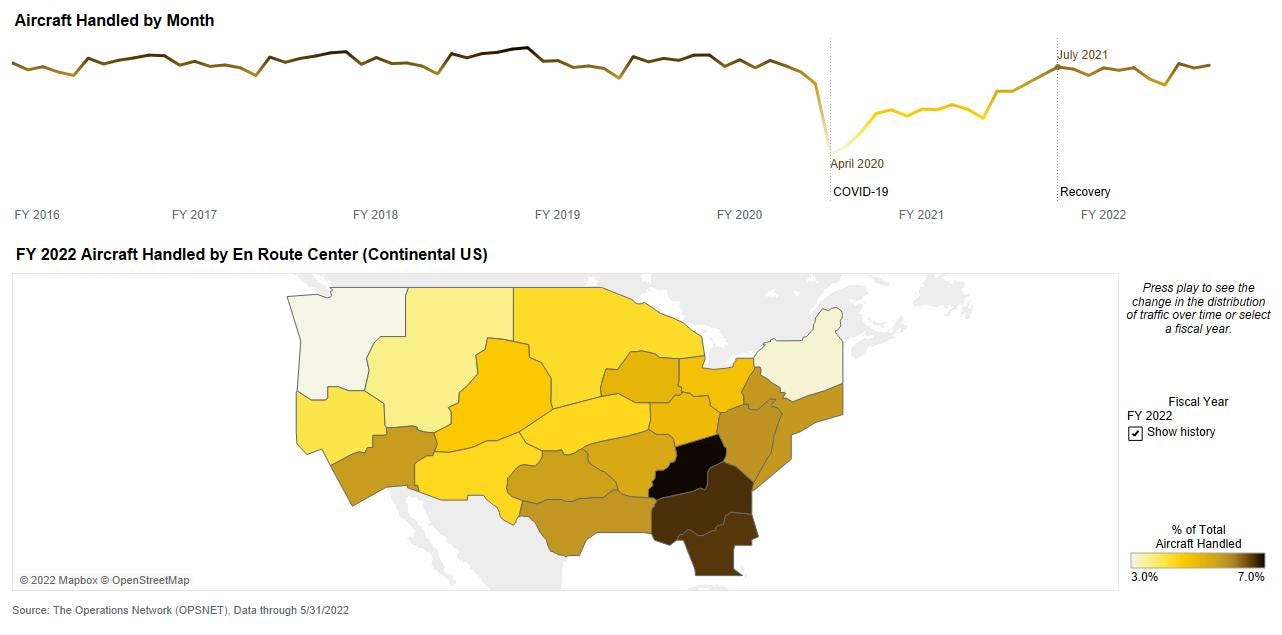
The FAA says airlines are flying more jetliners into Florida where the weather has the greatest impact in the US. (Credit: FAA)
The head of the airline’s association, Airlines for America (A4A), sent a letter to the Transportation Secretary complaining that some of the industry’s woes are a result of the FAA’s air traffic control system (ATC). The finger-pointing by Nick Calio was surprisingly strong, saying that one airline claims that ATC issues, “were a factor in at least one-third of recent cancellations.” Calio acknowledged weather has been a problem, but went on to say, “ATC staffing challenges have led to traffic restrictions under blue sky conditions.”
LOOKING FOR SPECIFICS
I asked A4A to provide an expert to speak about these points. They declined. When I asked specifically about which airline is making these accusations and when blue sky cancellations effected operations, I did not get a response.

A4A's Nick Calio's letter to DOT Sec. Buttigieg. (Credit: A4A)
The complaining airline may be Frontier. CEO Barry Biffle told DealBook this week, “the number one issue that has impacted our operations has been air traffic control.”
The FAA apparently had enough with this blame game and issued a statement blasting the airlines. “After receiving $54 billion in pandemic relief to help save the airlines from mass layoffs and bankruptcy, the American people deserve to have their expectations met,” the FAA said.
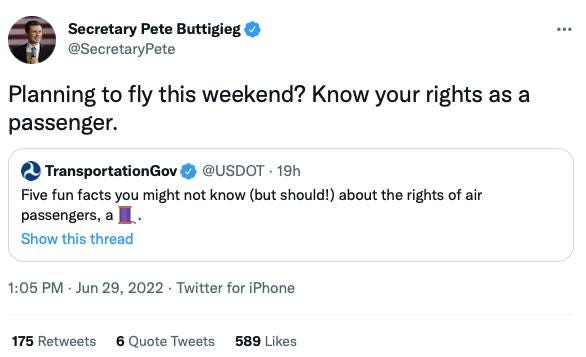
Sec. Buttigieg tweeted a link to passenger rights list just at the July 4th weekend travel was about to begin.
The FAA does acknowledge it has suffered some staffing shortfalls in ATC centers. That became apparent last October at the very important ATC center in Jacksonville, Florida. Weather, space launches, and closed airspace for DOD/military operations led to a nightmare for Southwest Airlines.
DOT Secretary Pete Buttigieg told NBC News that lessons were learned in Jacksonville that will be a template for other centers around the country. He has warned the airlines to meet their schedules.
DOT Secretary Pete Buttigieg admits there have been challenges for ATC, but says those problems are not responsible for the vast majority of airline troubles this summer. (Credit: NBC News)
I asked the FAA for an expert to interview about those lessons learned. The FAA declined and instead offered links to a couple podcasts about its operations.
The FAA is trying to hire. If you take a look at the agency’s twitter feed in recent weeks there are many tweets pitching readers to join the workforce. It’s a recognition that the FAA needs more controllers.

Politicians are getting involved. Sen. Bernie Sanders rejects the airlines’ finger-pointing and is calling on the Transportation Secretary to fine the carriers for canceled flights they know they can’t staff.
ATC IMPACT
Where is the truth? I talked to two sources familiar with this situation who suggest ATC troubles are responsible for a very small percentage of delays and cancellations (nothing like what A4A suggests). Just like airlines, the FAA is facing COVID absences, and complaints of overtime and a sixth workday many weeks.
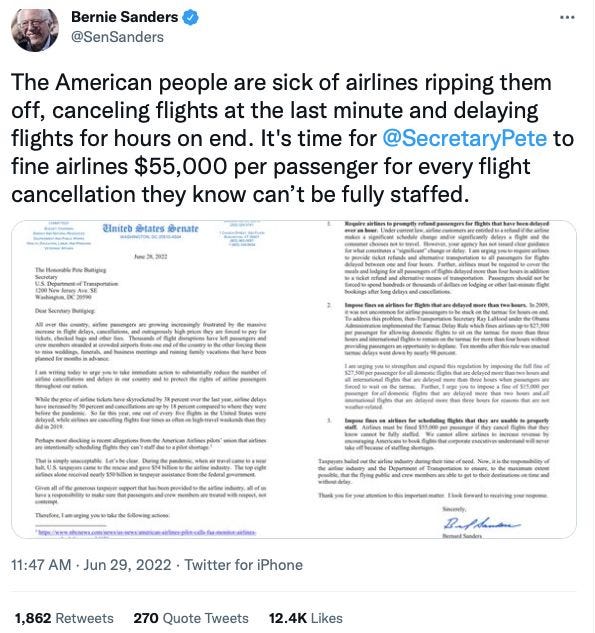
Maybe the fact that the A4A and the FAA both declined interviews suggests they are hoping to avoid inflaming the situation any further.
Tempers will be heated in airports around the country this summer. Finger-pointing probably won’t help.
(Cover photo taken July 2, 2022 at Orlando Airport. Credit: Paul Hennessy/SOPA Images/LightRocket/Getty Images)


